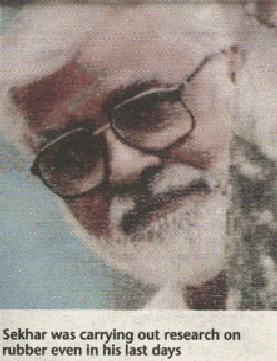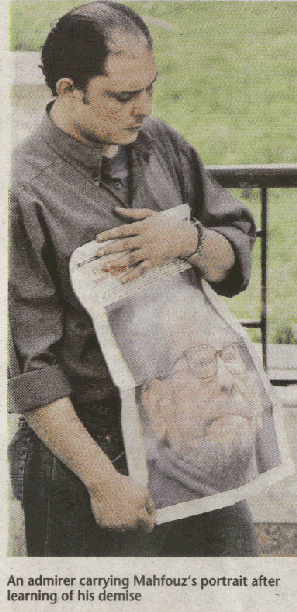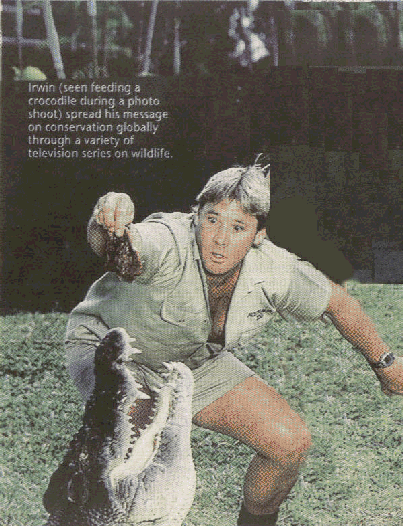Farewell to the iconic 'libraries
Dato' Dzulkifli Abd Razak
Article
The New Sunday Times - 09/17/2006
An African saying likens a learned person to a proverbial library. "When a learned dies, a library is burned down," goes the proverb. In the last few weeks, at least three such "libraries" burned down, one of which was our very own.
On Sept 6, Tan Sri Balachandra Chakkingkal Sekhar, fondly known as Mr Natural Rubber, Malaysia's world-famous pioneer rubber researcher, passed away.

He was the first Malaysian to head the Rubber Research Institute (RRI) Malaysia, and later was made the chairperson of the Malaysian Rubber Research Development Board.
He died of a heart attack at the age of 76 when he was in Chennai, India, as a visiting professor of Anna University to pursue his life-time passion—rubber research.
Born during a rubber slump, little did he know that he would be responsible in changing all that when he landed a job at the RRI.
It was under his leadership that RRI went through a number of achievements, especially in advancing natural rubber research, a commodity that helped place Malaysia on the world map as the foremost producer.
Much of this can be attributed to Sekhar whose contributions ranged from assisting local smallholders in uplifting their livelihood to the introduction of a worldwide rubber grading system—the SMR grading system.
All in all, he dedicated more than 50 years of his life to the rubber sector, earning himself a number of accolades, including the coveted 1973 Ramon Magsaysay award.
He also had the distinction of being the first Asian director of the Rubber Research Institute of Malaysia and subsequently was also the first Asian controller of rubber research and chairman of the Malaysian Rubber Research and Development Board.
Under his inspiration too, the Tun Abdul Razak Research Centre (TAR-RC), a UK-based research and development centre at Brickendonbury, grew to great heights and gained an international reputation for its excellence in research, modernisation of the rubber industry, and for vigorous promotion and expansion of rubber usage.
It was to be expected, therefore, that he should speak passionately against the proposed multi-million sports academy at Brickendonbury vis-a-vis the TARRC.
After all, he regarded the centre as "a unique window to Western science and expertise which Malaysia can tap at will".
He claimed that the reputation of TARRC had been established in many areas of science across the globe, not only as being outstanding but as one of a kind.
Many of its researchers now serve as professors in world-renowned universities.
Thanks to his dedication and far-sighted views, Malaysia has benefited tremendously from his legacy till this day.
On a different front, another "library" was burned in Cairo, Egypt.
A towering literary personality, Naguib Mahfouz, left us on Aug 25 at the age of 95, several weeks after his health suddenly deteriorated.
Egypt's most renowned intellectual-philosopher-thinker, Mahfouz had no fewer than 30 novels, more than 200 articles and more than 100 short stories to his name.
He won the Nobel Prize for Literature in 1988 and became the first Arab writer to be awarded the prize.
He saw himself as a "happy and grateful receiver of Egyptian, Islamic and Western cultural traditions" (The Economist, Sept. 2) — a happy blend of East and West.
Born in 1911 to a merchant family, he was the youngest of seven children.
His father wanted him to do medicine, but instead Mahfouz read philosophy at King Fuad I University (Cairo University), graduating in 1934.

He began writing at the age of 17 and published his first novel in 1939.
In 1922, the discovery of Tutenkhamen's tomb had a definite impact on him and he began to dabble in writing historical novels set in ancient Egypt.
He also wrote about the clash between the modern and traditional, the question of poverty, as well as the alienation of the individual. Half of his novels have been made into films which have circulated throughout the Arabic-speaking world.
One controversial book caused him harm when he was attacked and stabbed in the neck at the age of 83.
This forced him to stop writing for five years, in spite of his passion to do so.
The Dreams (2005) was his first major work since the attack in 1994.
First serialised in a Cairo magazine, the book is regarded by some as the richly condensed sum of more than nine decades of artistic genius and everyday experience.
His brilliant works will keep Mahfouz fresh in the minds of many for a long time to come.
On Sept 4, another "library" was burned in Australia. And the world felt the loss of famous "crocodile hunter" Steve Irwin.

At the age of 44, his "freak" death created a vacuum in the lives of many, especially animal lovers and children.
His heart was fatally pierced by a barb from a short-tail stingray while diving near the Great Barrier Reef.
Reportedly, he came on top of the serrated barb that cost him his life.
He was filmed pulling the barb before losing consciousness and probably died of a heart attack rather than the injury.
Born in 1962 to parents who were both naturalists, Irwin grew up around reptiles, especially crocodiles, and other dangerous animals.
As a result, he learnt how to handle animals well at the tender age of nine.
Thus, it is not surprising that he turned out to be a keen crocodile handler and trapper, and also a dedicated conservationist, in particular species as well as habitats that were under the threat of extinction.
Here, he considered himself as "a wildlife warrior" whose mission was "to save the world's endangered species". Though offered a state funeral, his family preferred a small ceremony attended by family members and friends.
Outside Australia Zoo, a place synonymous with his name, admirers and friends gathered to place mementos and flowers as a mark of fond respect for a very dedicated nature lover.
Aptly enough, it was from the zoo that khaki-clad Irwin spread his message globally through a variety of television series and many other projects to heighten our awareness about the sad state of the world today.
True to the African wisdom, the legacy of such great persons should be preserved and nurtured through the creation of many more iconic "libraries", more so when the world is now obsessed with hawkish military buildups.
Article
The New Sunday Times - 09/17/2006
An African saying likens a learned person to a proverbial library. "When a learned dies, a library is burned down," goes the proverb. In the last few weeks, at least three such "libraries" burned down, one of which was our very own.
On Sept 6, Tan Sri Balachandra Chakkingkal Sekhar, fondly known as Mr Natural Rubber, Malaysia's world-famous pioneer rubber researcher, passed away.

He was the first Malaysian to head the Rubber Research Institute (RRI) Malaysia, and later was made the chairperson of the Malaysian Rubber Research Development Board.
He died of a heart attack at the age of 76 when he was in Chennai, India, as a visiting professor of Anna University to pursue his life-time passion—rubber research.
Born during a rubber slump, little did he know that he would be responsible in changing all that when he landed a job at the RRI.
It was under his leadership that RRI went through a number of achievements, especially in advancing natural rubber research, a commodity that helped place Malaysia on the world map as the foremost producer.
Much of this can be attributed to Sekhar whose contributions ranged from assisting local smallholders in uplifting their livelihood to the introduction of a worldwide rubber grading system—the SMR grading system.
All in all, he dedicated more than 50 years of his life to the rubber sector, earning himself a number of accolades, including the coveted 1973 Ramon Magsaysay award.
He also had the distinction of being the first Asian director of the Rubber Research Institute of Malaysia and subsequently was also the first Asian controller of rubber research and chairman of the Malaysian Rubber Research and Development Board.
Under his inspiration too, the Tun Abdul Razak Research Centre (TAR-RC), a UK-based research and development centre at Brickendonbury, grew to great heights and gained an international reputation for its excellence in research, modernisation of the rubber industry, and for vigorous promotion and expansion of rubber usage.
It was to be expected, therefore, that he should speak passionately against the proposed multi-million sports academy at Brickendonbury vis-a-vis the TARRC.
After all, he regarded the centre as "a unique window to Western science and expertise which Malaysia can tap at will".
He claimed that the reputation of TARRC had been established in many areas of science across the globe, not only as being outstanding but as one of a kind.
Many of its researchers now serve as professors in world-renowned universities.
Thanks to his dedication and far-sighted views, Malaysia has benefited tremendously from his legacy till this day.
On a different front, another "library" was burned in Cairo, Egypt.
A towering literary personality, Naguib Mahfouz, left us on Aug 25 at the age of 95, several weeks after his health suddenly deteriorated.
Egypt's most renowned intellectual-philosopher-thinker, Mahfouz had no fewer than 30 novels, more than 200 articles and more than 100 short stories to his name.
He won the Nobel Prize for Literature in 1988 and became the first Arab writer to be awarded the prize.
He saw himself as a "happy and grateful receiver of Egyptian, Islamic and Western cultural traditions" (The Economist, Sept. 2) — a happy blend of East and West.
Born in 1911 to a merchant family, he was the youngest of seven children.
His father wanted him to do medicine, but instead Mahfouz read philosophy at King Fuad I University (Cairo University), graduating in 1934.

He began writing at the age of 17 and published his first novel in 1939.
In 1922, the discovery of Tutenkhamen's tomb had a definite impact on him and he began to dabble in writing historical novels set in ancient Egypt.
He also wrote about the clash between the modern and traditional, the question of poverty, as well as the alienation of the individual. Half of his novels have been made into films which have circulated throughout the Arabic-speaking world.
One controversial book caused him harm when he was attacked and stabbed in the neck at the age of 83.
This forced him to stop writing for five years, in spite of his passion to do so.
The Dreams (2005) was his first major work since the attack in 1994.
First serialised in a Cairo magazine, the book is regarded by some as the richly condensed sum of more than nine decades of artistic genius and everyday experience.
His brilliant works will keep Mahfouz fresh in the minds of many for a long time to come.
On Sept 4, another "library" was burned in Australia. And the world felt the loss of famous "crocodile hunter" Steve Irwin.

At the age of 44, his "freak" death created a vacuum in the lives of many, especially animal lovers and children.
His heart was fatally pierced by a barb from a short-tail stingray while diving near the Great Barrier Reef.
Reportedly, he came on top of the serrated barb that cost him his life.
He was filmed pulling the barb before losing consciousness and probably died of a heart attack rather than the injury.
Born in 1962 to parents who were both naturalists, Irwin grew up around reptiles, especially crocodiles, and other dangerous animals.
As a result, he learnt how to handle animals well at the tender age of nine.
Thus, it is not surprising that he turned out to be a keen crocodile handler and trapper, and also a dedicated conservationist, in particular species as well as habitats that were under the threat of extinction.
Here, he considered himself as "a wildlife warrior" whose mission was "to save the world's endangered species". Though offered a state funeral, his family preferred a small ceremony attended by family members and friends.
Outside Australia Zoo, a place synonymous with his name, admirers and friends gathered to place mementos and flowers as a mark of fond respect for a very dedicated nature lover.
Aptly enough, it was from the zoo that khaki-clad Irwin spread his message globally through a variety of television series and many other projects to heighten our awareness about the sad state of the world today.
True to the African wisdom, the legacy of such great persons should be preserved and nurtured through the creation of many more iconic "libraries", more so when the world is now obsessed with hawkish military buildups.
